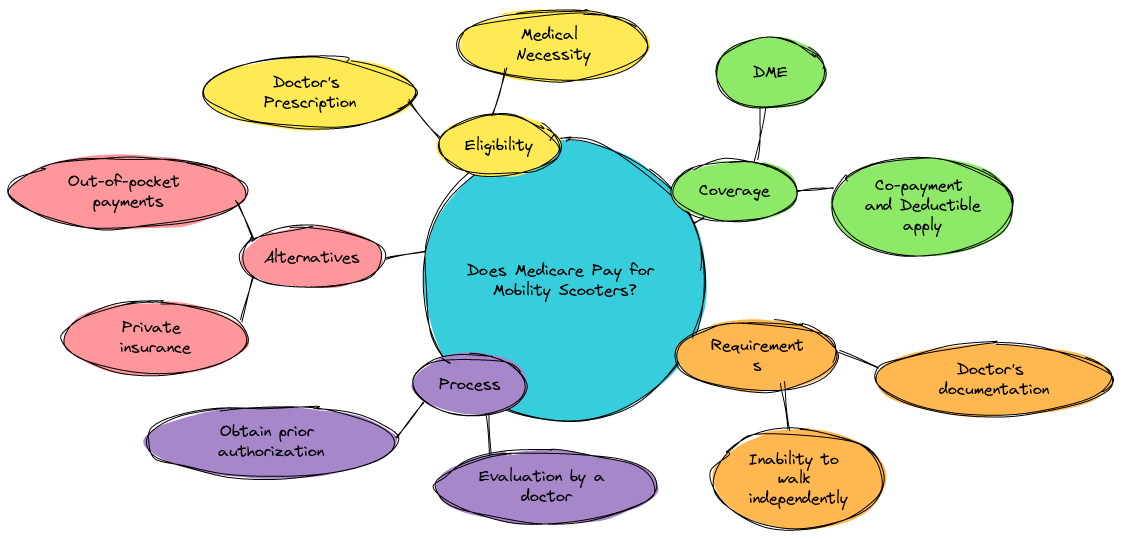If you’re wondering what mobility scooters Medicare covers, you’re not alone. Many folks have questions about what Medicare offers when it comes to helping you stay mobile. So let’s break it down—clear, simple, and with a bit of humor—because honestly, navigating Medicare can feel like running a marathon. But don’t worry we’ll walk through it together (or scoot if that’s more your speed).
Does Medicare Pay for Mobility Scooters?
Yes but there’s a catch (isn’t there always?). Medicare Part B may cover mobility scooters if they are deemed medically necessary. This means your doctor has to say that the scooter is essential for you to function day-to-day. So you’re not just cruising around the mall looking cool. You need to have some real mobility limitations that prevent you from performing daily activities, like getting to the fridge for that second bowl of ice cream.
How Do You Qualify for a Medicare-Covered Scooter?
To get a scooter covered by Medicare, you’ll need to meet certain requirements. Here’s how it works:
- Doctor’s prescription – Your physician has to provide a written order stating that a scooter is medically necessary.
- Home use – The scooter must be primarily for use inside your home. So if you’re hoping to use it for your next cross-country road trip… probably not the best fit.
- Supplier enrolled in Medicare – You have to get the scooter from a supplier that’s enrolled in Medicare. Otherwise no coverage no deal.
“Many of our clients find that it’s not as easy as just saying ‘I need a scooter’ and then Medicare swoops in like a superhero,” says Henry Beltran, owner of Medicare Advisors Insurance Group LLC. “The process can take some time but if you work with the right professionals it’s totally doable.”
What Types of Scooters Does Medicare Cover?
Medicare will typically cover power-operated scooters or mobility scooters. These are the types of scooters meant for indoor or light outdoor use (think more about scooting down your hallway than racing through the park).
Let’s go over the main types:
3-Wheel Mobility Scooters
- Advantages: These scooters are great for getting around tight spaces since they have a tighter turning radius. Perfect for navigating your living room without knocking over all your houseplants.
- Drawbacks: With only three wheels balance can sometimes be a little wobbly. So if you take a sharp turn like you’re on a race track… you may end up getting a bit too close to the ground.
4-Wheel Mobility Scooters
- Advantages: These are more stable than the 3-wheel versions thanks to that fourth wheel. They offer better balance and are sturdier for outdoor use.
- Drawbacks: They’re less nimble in tight spaces so you might feel like you’re driving a tank in your house. “Good luck making a smooth U-turn in the kitchen,” laughs Henry Beltran.
Heavy-Duty Scooters
- Advantages: These are built to handle more weight and can go over rougher terrain. So if you’re planning on taking your scooter for a ride in the great outdoors these might be a good fit.
- Drawbacks: They’re big and bulky making them less convenient for indoor use. Plus, they’re about as easy to maneuver as a refrigerator on wheels.
What’s the Cost?
The good news is if you qualify for Medicare coverage Medicare Part B usually pays 80% of the cost of the scooter. You’re left to cover the remaining 20% (along with any deductibles and copayments).
But before you pop open the champagne let’s do some math. Scooters can cost anywhere from $800 to $5,000 depending on the model and features. So that 20% can still be a hefty chunk of change. If your scooter costs $2,000 you’re looking at a $400 bill out-of-pocket.
Tips to Save Money on Your Scooter:
- Shop around for suppliers to compare prices.
- Check for additional insurance coverage. Some Medigap or Medicare Advantage plans may offer further assistance.
- See if there are local programs or nonprofits that offer discounts or help cover costs for mobility equipment.
What Are the Steps to Get a Medicare-Covered Mobility Scooter?
Here’s a quick breakdown of the process:
- Visit your doctor: Schedule an appointment to discuss your mobility needs.
- Get a prescription: If your doctor determines the scooter is medically necessary they will write you a prescription.
- Find a Medicare-enrolled supplier: Only certain suppliers work with Medicare so make sure you’re getting your scooter from the right place.
- Submit paperwork: You or your doctor will need to submit the necessary paperwork to Medicare.
- Wait for approval: It can take some time for Medicare to review and approve your request.
“We always advise our clients to be patient with this process,” says Henry Beltran. “It’s not as fast as we all would like but it’s important to follow the steps carefully to ensure coverage.”
Find Medicare Plans in 3 Easy Steps
We can help get up to $0 monthly premium Medicare plans
Potential Pitfalls to Avoid (with a Dash of Humor)
- Not checking your supplier’s status: You don’t want to get your scooter from Bob’s Discount Scooters only to find out Medicare won’t reimburse you because Bob isn’t Medicare-approved.
- Forgetting that it’s for home use: Medicare wants to know that your scooter is for getting around your home not for cruising down to the beach for margaritas.
- Choosing the wrong scooter size: Make sure you get a scooter that fits your needs. Too small and you’ll feel like you’re squeezing into a toddler’s tricycle. Too big and you might need a forklift just to get it into the house.
Find Medicare Plans in 3 Easy Steps
We can help get up to $0 monthly premium Medicare plans
Conclusion
If you think a mobility scooter would improve your quality of life and you meet the criteria for Medicare coverage you can definitely get some help from the program. Just remember—you need that all-important doctor’s note Medicare-approved supplier and a little patience along the way.
Scooting around your home can be a big relief (and maybe a little fun too). Whether you go for a 3-wheel 4-wheel or heavy-duty option Medicare could be the ticket to help cover the cost.
Henry Beltran sums it up nicely: “At the end of the day it’s about making sure you can move around comfortably and safely. And if a scooter helps you do that then it’s worth navigating the Medicare maze to get it.”
Final Tips for Smooth Scooting:
- Make sure your doctor and supplier are Medicare-enrolled.
- Keep all your paperwork handy because Medicare loves paperwork.
- Don’t be afraid to ask questions—we’re here to help!







